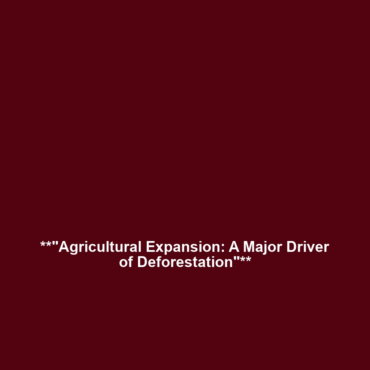Agricultural Expansion: The Primary Driver of Deforestation
Introduction
Agricultural expansion stands as one of the foremost drivers of deforestation, deeply intertwined with the broader issues of biodiversity loss. As global populations grow, the demand for food and land intensifies, leading to significant changes in land use. Over the past decades, vast tracts of forests have been cleared to accommodate agricultural practices, which has devastating consequences for ecosystems around the world. This article delves into the significance of agricultural expansion and its pivotal role in driving deforestation while emphasizing its impacts on biodiversity.
Key Concepts
Understanding Agricultural Expansion
Agricultural expansion refers to the increase in land devoted to farming activities, which often involves the conversion of forested areas into cropland or pastures. This process is primarily fueled by:
- Population Growth: Increasing populations necessitate more food production.
- Economic Development: Wealthier nations and emerging economies alike expand agriculture to support economic growth.
- Demand for Animal Products: The rising global demand for meat and dairy contributes significantly to land conversion.
These factors collectively highlight how agricultural expansion acts as a primary driver of deforestation, leading to habitat destruction and biodiversity loss.
Applications and Real-World Uses
Understanding how agricultural expansion operates as a primary driver of deforestation is vital for addressing environmental concerns. Key applications include:
- Sustainable Agriculture: Implementing practices that mitigate land conversion impacts, such as agroforestry and permaculture.
- Policy Development: Formulating policies that balance agricultural needs with environmental conservation.
- Conservation Initiatives: Establishing protected areas to preserve habitats affected by agricultural expansion.
These applications reinforce the necessity for integrating agricultural practices within the scope of biodiversity conservation.
Current Challenges
Despite the importance of understanding agricultural expansion, several challenges persist:
- Data Limitations: A lack of comprehensive data hinders accurate assessments of deforestation rates due to agriculture.
- Economic Incentives: The financial pressures on farmers to continually expand land undermine conservation efforts.
- Policy Implementation: Ineffective regulations often fail to prevent harmful agricultural practices that lead to deforestation.
These issues complicate efforts to study and address the impacts of agricultural expansion on biodiversity.
Future Research and Innovations
Upcoming research and innovations in agricultural practices hold promise for reducing deforestation:
- Precision Agriculture: Utilizing technology to optimize farming inputs and reduce land use.
- Genetic Engineering: Developing crop varieties that require less land and are more resilient to climate change.
- Blockchain in Agriculture: Implementing transparent systems for sustainable sourcing of agricultural products.
These advancements signify potential pathways to mitigate the adverse effects of agricultural expansion on forests and biodiversity.
Conclusion
Agricultural expansion continues to be a primary driver of deforestation, with serious repercussions for biodiversity loss. Understanding its dynamics is essential for developing effective strategies that promote sustainable practices within agriculture to protect our remaining forests. As global citizens, advocating for sustainable agricultural policies and supporting conservation efforts can foster a healthier ecosystem. For further reading on related topics, explore our articles on sustainable agriculture and biodiversity conservation.
